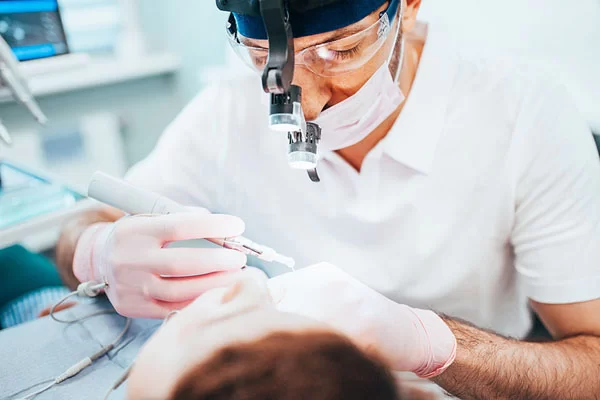Please note we may not offer this service at our office. Call (413) 538-7400 for more information.
Discover How a Metal Dental Crown Can Revitalize Your Tooth
Did you know there are several options available when considering dental crowns? One of the most prevalent materials used is metal. Metal-based dental crowns have been utilized for decades and remain a favored choice among many patients.
Gain further insights into metal dental crowns by consulting with our dentist in Holyoke, MA. Call (413) 538-7400 today.
What Are Metal Dental Crowns?
Metal dental crowns have been a reliable choice for many years, favored by numerous patients. These crowns are renowned for their robustness and longevity, making them ideal for back teeth. A metal crown is highly resistant to wear and tear and can endure substantial force.
What Type of Material is Used for a Metal Dental Crown?
Metal dental crowns come in various types, including:
- Gold crowns are crafted from a gold alloy, known for their excellent biocompatibility and resistance to corrosion.
- Silver crowns consist of a blend of silver, tin, and other metals. They’re durable and cost-effective but may discolor over time.
- Platinum crowns are made from a platinum alloy, offering strength, durability, and corrosion resistance, although they’re pricier than other metal crowns.
- Palladium crowns combine palladium, gold, and other metals, making them suitable for patients with metal allergies.
- Base metal alloy crowns are composed of non-noble metals like nickel, chromium, and titanium. They’re strong, durable, and affordable but can trigger allergic reactions in some individuals.
Benefits of a Metal Crown
Opting for a metal crown offers numerous advantages, such as:
- Strength and Durability: Metal crowns are incredibly robust and can endure considerable pressure, making them an excellent option for molars.
- Longevity: With proper care and maintenance, these crowns can last for many years, often exceeding 20 years.
- Conservation of Natural Tooth Structure: They require minimal removal of the natural tooth structure compared to other crowns like porcelain or ceramic.
- Wear and Tear Resistance: Metal crowns are less prone to chipping or breaking compared to other crown types.
- Biocompatibility: Many metals used in dental crowns, such as gold and palladium, are highly biocompatible and unlikely to cause allergic reactions.
Drawbacks of Metal Crowns
When considering a metal crown, there are some potential downsides to be aware of:
- Appearance: Metal crowns aren’t tooth-colored, which can make them more noticeable compared to other crown types, particularly when placed on front teeth.
- Heat Sensitivity: Metal crowns can conduct heat and cold, potentially leading to discomfort for some patients.
- Wear on Opposing Teeth: Due to their hardness, metal crowns may cause increased wear on opposing teeth compared to other crown materials.
- Cost: Depending on the alloy used, metal crowns can be more expensive than other types of crowns.
- Allergic Reactions: Although uncommon, some patients may experience allergies to specific metals in dental crowns, potentially leading to inflammation and other health concerns.
The Metal Dental Crown Process
Preparation and Impressions
The initial step in obtaining a metal crown involves preparing the tooth. Your dentist will eliminate any decay or damage and reshape the tooth to accommodate the crown. If the existing tooth structure is insufficient, they may need to build it up to support the crown adequately.
After the tooth is prepared, your dentist will create impressions of the tooth and the surrounding teeth. These impressions are sent to a dental lab, where a custom-made crown is crafted to fit your tooth and bite perfectly. In the meantime, your dentist will place a temporary crown to protect your teeth until your permanent crown is ready.
Crown Placement
Once your permanent crown is ready, you’ll return to the dental office for the placement procedure. The temporary crown will be removed, and the new crown will be placed on the tooth to assess the fit and make any necessary adjustments.
After ensuring a perfect fit, your Holyoke dentist will secure the crown using a dental adhesive. They will then evaluate your bite to confirm that the crown aligns correctly with the opposing teeth.
Follow-Up Care
Once your crown has been placed, we will provide you with guidance on how to maintain your new crown. It’s important to continue practicing good oral hygiene, which includes regular brushing and flossing, to ensure the health of the crown and the surrounding teeth.
Metal Crown Costs
The price of metal crowns can fluctuate based on various factors, such as the location, the dentist’s level of experience, the complexity of the procedure, and any additional treatments needed. Typically, metal crowns are more cost-effective compared to other crown types due to the affordability of the materials and the straightforward fabrication process.
On average, a metal crown may cost between $800 and $1,500 per tooth. However, this is merely an approximation, and costs can differ widely. Dental insurance might also impact the out-of-pocket expenses for a metal crown, as some insurance policies may cover part of the expense.
Alternative Crown Options
Due to the potential for metal crowns to affect the aesthetic of a smile, many patients opt for different types of crowns:
- Porcelain-Fused-to-Metal (PFM) Crowns: These crowns feature a metal base with porcelain fused over it. The porcelain offers a more natural tooth-like appearance, while the metal provides strength. However, if the gums recede, the metal base might become visible through the porcelain.
- All-Porcelain or All-Ceramic Crowns: Entirely crafted from porcelain or ceramic materials, these crowns are celebrated for their superior aesthetic qualities. They offer translucence and color that closely mimic natural teeth. While they may not be as durable as metal or PFM crowns, advancements in materials have enhanced their strength.
- Zirconia Crowns: Made from a robust ceramic material, zirconia crowns can be used alone or layered with porcelain for enhanced aesthetics. Their strength rivals that of metal, and they’re suitable for both front and back teeth.
- Composite Resin Crowns: Constructed from a blend of plastic and glass, these crowns are more affordable than other types. They can be visually appealing, but they may wear down more quickly compared to other materials.
If we determine any other crown options that aren’t for you, we may provide crown alternatives that suit your dental needs.
Frequently Asked Questions
Yes, metal crowns are typically regarded as safe. They have been utilized for decades and have a well-established history of success. However, some patients might have allergies to specific metals used in dental crowns, so it’s crucial to discuss any allergies or concerns with your dentist.
Metal crowns are known for their longevity, often lasting 20 years or more with proper care and maintenance. The lifespan of a dental crown can vary based on factors such as oral hygiene practices, diet, and general wear and tear.
Although metal crowns are generally safe, they may interfere with certain medical procedures, including MRI (magnetic resonance imaging). Metal can create artifacts on the MRI image, potentially complicating the interpretation of the results. If you have a metal dental crown, be sure to inform your healthcare provider before undergoing an MRI so they can take the necessary precautions.
Find Out if Metal Crowns Suit Your Dental Needs
Metal crowns might be an ideal choice if you’re looking for a robust and long-lasting solution to address tooth decay or other dental issues. Discuss your dental crown options with Dr. Eric Chen, who can guide you in making the best decision for your specific needs.
To schedule a consultation and take the first step towards achieving a healthy, radiant smile, contact our Holyoke dental office at (413) 538-7400. We’re pleased to serve patients in Holyoke, Westfield, Southampton, South Hadley, and the Greater Springfield area.

